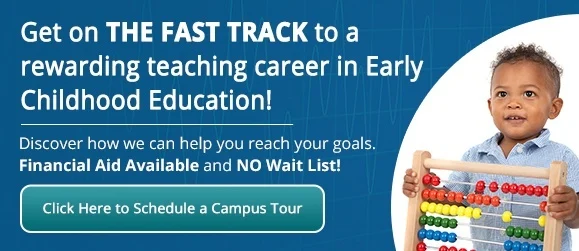5 Key Skills for Early Childhood Educators
Posted On January 26,2024
The role of early childhood educators is pivotal in establishing the groundwork for a child’s educational journey. Their influence extends beyond traditional teaching methods, encompassing emotional, social, and cognitive development. To excel in this dynamic profession, educators must possess a diverse set of skills that go beyond textbook knowledge. Early childhood educators aren’t just teachers. They are mentors, guides, and emotional superheroes all rolled into one.

Excelling in this creative profession demands more than the ability to recite textbook chapters in your sleep. It’s about wielding a toolkit filled with diverse skills to navigate emotional intelligence, social dynamics, and cognitive growth. If you want to become an early childhood educator, it helps to understand specific skills crucial for excelling in this dynamic profession.
Below are five teaching skills essential for early childhood educators and valuable tips on how aspiring professionals can develop and enhance these skills.
Patience and Flexibility
Patience is undeniably one of the most critical skills for early childhood educators. Dealing with young children requires a high degree of patience and understanding, as every child develops at their own pace. Flexibility is equally important, as each day in a classroom presents unique challenges and opportunities. Educators must be adaptable to different learning styles and be patient when addressing individual needs.
Tips for Development:
- Practice mindfulness techniques to remain calm in stressful situations.
- Volunteer or work in environments with diverse groups of children to build tolerance.
- Take on varied responsibilities to enhance adaptability and problem-solving skills.
Effective Communication
Successful teaching relies on clear and efficient communication as its foundation. Early childhood educators must be able to convey information in a way that is easily understood by young children, their parents, and other caregivers. Excellent verbal and non-verbal communication skills foster a positive learning environment and help build strong relationships with children and their families.
Tips for Development:
- Engage in public speaking or join a communication-focused club to build confidence.
- Practice active listening to understand children’s needs and concerns.
- Seek feedback from mentors or peers to continuously refine communication skills.
Creativity and Imagination
Early childhood education is all about fostering creativity and imagination in young minds. Educators should be able to design engaging and interactive learning activities that captivate children’s attention and stimulate their curiosity. A creative approach helps make learning enjoyable, turning the classroom into a space where children eagerly explore and discover new concepts.
Start Your ECE Process NowTips for Development:
- Participate in arts and crafts activities to enhance creativity.
- Collaborate with other educators to brainstorm and share innovative teaching methods.
- Attend workshops or conferences focused on incorporating creativity into education.
Observation and Assessment
Understanding each child’s unique strengths and challenges requires keen observation skills. Early childhood educators must be adept at assessing children’s progress and identifying areas that need additional attention. Frequent observations help customize teaching methods to address individual needs, ensuring a comprehensive approach to development.
Tips for Development:
- Volunteer or intern in diverse early childhood settings to observe various learning styles.
- Take courses on child development and assessment techniques.
- Utilize technology tools and resources for efficient data collection and analysis.
Teamwork and Collaboration
Collaboration is vital in the field of early childhood education. Educators often work alongside other professionals, parents, and support staff to create a comprehensive support system for children. Strong teamwork enables educators to share insights, coordinate activities, and ensure a cohesive learning experience.
Tips for Development:
- Participate in team-building exercises or workshops.
- Engage in community activities to foster collaboration with parents and local organizations.
- Explore chances for professional growth and networking within the education field.
Becoming a successful early childhood educator goes beyond acquiring academic knowledge. It requires a combination of interpersonal, creative, and observational skills. By focusing on developing patience, effective communication, creativity, observation, and teamwork, prospective educators can establish a solid foundation for a rewarding and influential career. Commitment to ongoing learning, consistent practice, and a dedication to personal development can empower early childhood educators to positively impact the lives of the children they teach, guiding them toward a lifelong learning and success journey.

Are You Ready to Take the Next Step?
Choosing a career as an early childhood educator is a rewarding journey that requires a unique blend of skills. If you are passionate about shaping young minds and positively impacting children’s lives for the better, it’s time to take the next step by contacting Athena Career Academy today. Our comprehensive Early Childhood Education Associate Degree Program provides you with everything you need and more.
Explore our Programs: Discover comprehensive programs at Athena Career Academy designed to equip you with the skills needed for a successful career in early childhood education.
Engage in Practical Learning: Our hands-on approach ensures that you understand the theories and gain practical experience, preparing you for the dynamic challenges of the classroom.
Connect with Experts: Benefit from the guidance of experienced educators and industry professionals dedicated to helping you develop the essential skills required in the field.
Embrace Lifelong Learning: Early childhood education is a dynamic field that constantly evolves. Stay ahead by engaging in continuous professional development, workshops, and networking opportunities.
Make a Difference: Become part of a community that recognizes the significance of early childhood education in shaping the future. Educators have the potential to leave a lasting mark on the lives of young learners.
Athena Career Academy can help you fulfill your dreams of becoming an early childhood educator. Contact us today to enroll.